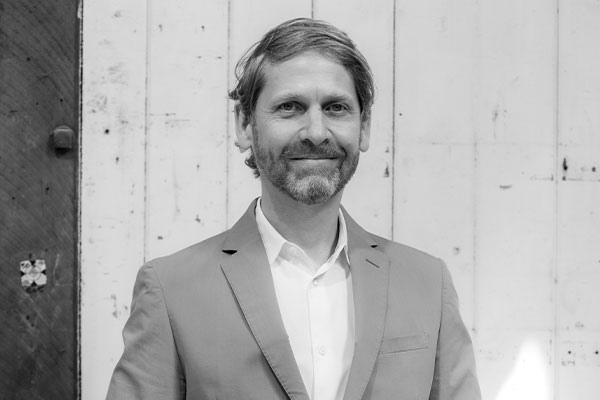
“I will really miss Patrick’s guidance. I constantly ask myself - what would Patrick think?”
Kip Williams, Artistic Director
Sydney Theatre Company’s outgoing Executive Director Patrick McIntyre has left an indelible mark on the organisation over more than 11 years in the role.
From driving the Company’s monumental Wharf Renewal Project, to raising the Company’s international profile and leading through the uncertainty of a global pandemic - he certainly leaves an undeniable legacy.
In honour of McIntyre’s departure to become the CEO of the National Film and Sound Archive, we spoke to him and some of his colleagues about his time at STC.
McIntyre first joined STC in 1993 after graduating with a communications degree from UTS. As Publications Manager, he wrote and edited the program notes as well as the subscriber magazine, Exstce, and his role then expanded into a broader marketing position.
After a few years at STC, Patrick worked as a consultant and freelance writer alongside several arts management roles - including Associate Executive Director of the Australian Ballet - before returning to STC as the Executive Director in 2010.
“It really felt fantastic to come back to STC, I’ve just always admired its work,” McIntyre said. “I love the collaborative nature of theatre, all the different elements that come together into a show. But I had a very clear idea of what kind of contribution I could make to the Company and so it was very satisfying to arrive and be able to do that.”
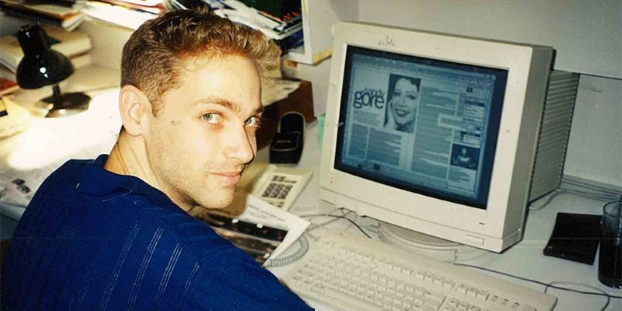
Patrick working on an STC program in 1993 Credit: STC archive
HIGHLIGHTS OF PATRICK’S TENURE
Wharf Renewal Project
In February 2021, STC officially reopened its premises at The Wharf, welcoming audiences for the first time since 2018 to its newly renovated home on Sydney Harbour. The 100-year-old timber shipping wharf at Walsh Bay - which was first transformed from a wool store to an award-winning theatre-making space in the 1980s - was upgraded to improve facilities and access and to modernise the theatre spaces.
The renovation project was initiated in 2013 by McIntyre and then Artistic Director, Andrew Upton to address three decades of continuous wear and tear, the growth and change of STC’s business operations and the need for operational, technological and environmental efficiency, as well as an opportunity to create a world class theatre experience for artists, workers and audiences.
“I had no idea when I started that the building was in such terrible shape and would need redoing,” McIntyre said. “I didn’t really dream of doing a big capital job - I just happened to be in this job when something had to be done about it. At first I didn't realise that it would be such a phenomenal project and phenomenal outcome - I couldn't be happier with it. It took so much bandwidth but it was necessary.”
Glenn Scott, principal architect with Hassell, said Patrick had been “fantastic” to work with - “probably one of the best clients you could hope for”.
“Architecture and performing arts are both creative industries, so there was an inherent respect for each other's expertise from the outset,” Scott said.
“Patrick was so proud of the final product - it’s always delightful to have a client so effervescent about the outcome.”
The Wharf Renewal Project was recognised with the prestigious Sir John Sulman Medal for Public Architecture at the 2021 Australian Institute of Architects NSW awards.
Artistic Director Kip Williams said the building project is “an incredible gift to the city and to the artistic community.”
“We now have this extraordinary facility and these amazing theatres that can last us for decades, and allow us to work in a way that we weren't able to before,” Williams said. “The creative possibilities for artists and audiences are through the roof now with this new building, and that's a huge legacy.”
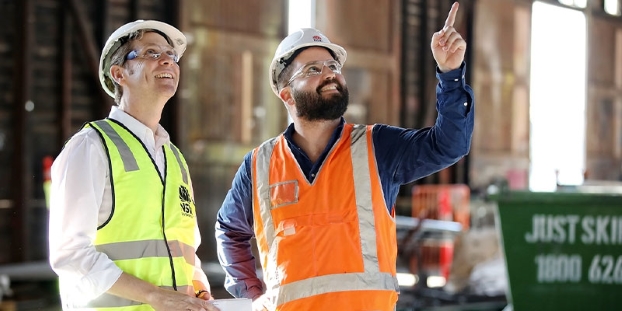
STC Executive Director, Patrick McIntyre and Artistic Director Kip Williams at the Wharf during construction in 2019. Credit: Prudence Upton
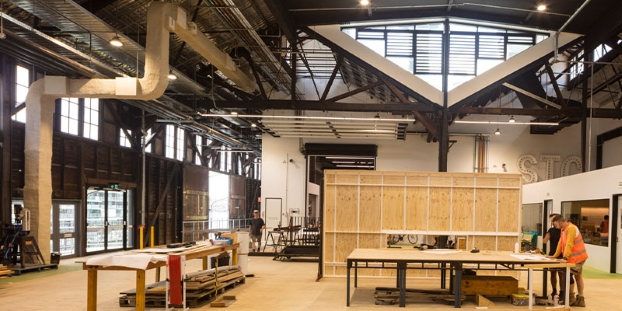
The Wharf renewal created an entirely new, world class facility that houses the entire theatre-making process under one roof. Credit: Brett Boardman
Raising the Company’s international profile
During his tenure, McIntyre has gone above and beyond to raise the international profile of the Company - having been instrumental in STC’s Broadway debut with The Present in 2017 and in taking the landmark production of The Secret River to Edinburgh International Festival and the National Theatre, London in 2019.
“The Company always toured internationally since the very early days, but obviously with Cate Blanchett and Andrew Upton as Artistic Directors there was huge interest in the Company,” McIntyre said. “Obviously, Cate was a major drawcard, but they very deliberately set out to transfer this awareness from her to the quality and distinctiveness of the Company itself. So that was something that I worked with them on, to make sure that these tours were building the STC brand internationally. I’d already had a bit of international touring experience, and it is always an incredible buzz to see first-hand the impact of incredible Australian performing arts on the world stage.”
In September 2021, STC also announced a landmark commercial ‘First Look’ agreement with Michael Cassell Group for all future works produced by the theatre company.
In the first agreement of its kind in Australia, STC’s productions will have the opportunity to be transferred or remounted as commercial productions to entertain audiences in new markets, with the intention of touring across Australia and internationally. The first production to benefit from the partnership with international touring will be STC Artistic Director Kip Williams' critically acclaimed adaptation of Oscar Wilde's The Picture of Dorian Gray, starring Eryn Jean Norvill as all 26 characters.
Of this agreement, McIntyre said: “This partnership with Michael Cassel Group creates enormous cultural and market development opportunities. STC has a long history of regional and national touring, but taking work overseas has remained more sporadic owing to our distance from key markets. This arrangement will not only help us expand audiences for our work locally via commercial remounts, but also to access MCG’s broader international networks so we can grow audiences for Australian theatre makers worldwide. The possibilities are tremendously exciting.”
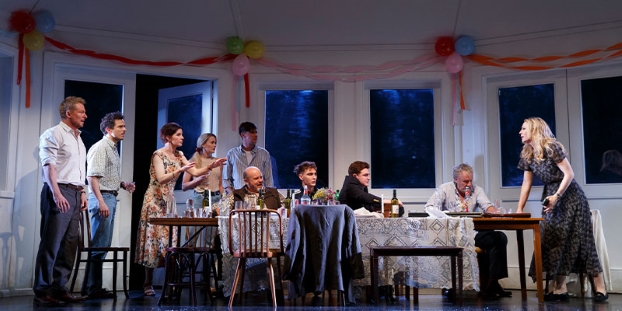
Leading through a pandemic
McIntyre has steered the Company through the extreme disruption to the theatre industry caused by the COVID-19 pandemic. In March 2020, theatres were shut down worldwide resulting in a revenue loss for STC of almost $18m. Led by Patrick, STC took an active role in sector advocacy and safety management and was one of the first theatre companies in the world to return to the stage six months later with a socially distanced season of Wonnangatta in September 2020. In February 2021, STC became the first theatre in NSW to play to 100% capacity houses after being granted an exemption from prevailing Health Orders by the NSW Government owing to the Company’s high standard of health policies and safety management.
The industry was then shut down again in June 2021, and over five months STC cancelled 335 performances nationally across nine productions - resulting in a box office revenue loss of $10.5m to date. In September, the Company was delighted to announce it would be returning to the stage in November with two productions - Julius Caesar and Death of a Salesman - to round out an incredibly difficult year.
Heather Mitchell, an actor who also sits on the STC Foundation and STC Board of Directors, said senior management, the board and donor community had “unanimous respect and admiration” for Patrick and the way in which he led the Company through such a difficult time.
“I don’t think, particularly over these last few months, that STC would be where it is if it weren’t for Patrick,” Mitchell said. “I can't even imagine the stress that he's undergone - with the Wharf renovation and now the pandemic and I just thank goodness he has been here.”
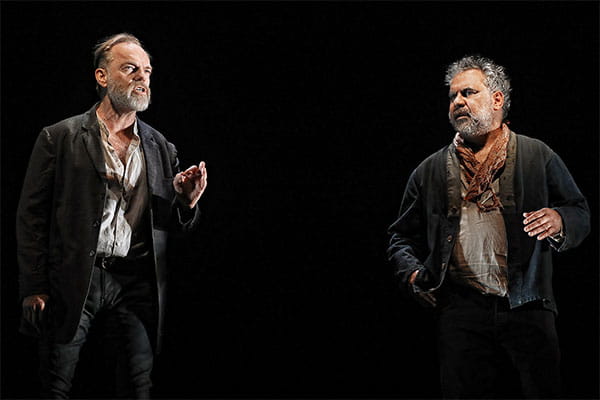
Hugo Weaving and Wayne Blair in Wonnangatta, one of the first theatre shows in the world to open after the pandemic shut the industry down in 2020. Credit: Prudence Upton
Supporting and developing artists/staff
Throughout his time at STC, the national culture around workplace mental health and culture has changed significantly. In 2018, McIntyre, in conjunction with STC’s Company Manager Sarah Stait, created an Emotional Risk Assessment within the workplace health and safety framework. It assesses the potential psychological impacts of the content of each play, or other elements of the production, so that the company can implement preventative strategies from the rehearsal room right through to the end of a season.
“I’m proud of the way the Company has led change in terms of respectful and safe workplaces,” McIntyre said.
“We already conducted risk assessments of the physical hazards of productions, but with the rising emphasis on mental health and safety, we now assess the theatre repertoire in terms of risks to the well-being of cast and crew. For instance, if there is material in the play that could be traumatic to act out night after night, we might arrange for a specialist to come into the rehearsal room and workshop these issues early in the process, and to consider coping strategies. We also think about things like whether people are working interstate, away from their families and normal support networks, or whether there are potentially stressful role requirements like nudity or simulated sexual activity. We want to create an environment where those things are brought up before problems arise, not try to deal with them after. I feel really happy that I was in this job in that historical moment in the industry - I found it very satisfying to be part of a really important structural response to make the industry better for everybody.”
Williams said McIntyre had been instrumental in leading the way so that change happened on a national level.
“The work he's done from a policy and procedure perspective has been phenomenal,” Williams said. “The fact that there are now universal, standardised policies and procedures across every major company in the country is a huge legacy. Certainly at STC, I just constantly have artists saying that it's the best company to work for. ‘I feel so safe, I feel so supported. It's such a positive and happy place to work.’”
Williams said it was McIntyre who, alongside Andrew Upton, saw STC’s potential as a talent incubator for directors through the Resident Director program - through which Williams got his start at the Company.
“STC has always had an incredible legacy of developing directors and designers, but before Patrick there had been a long period of not having an incubation program for directors within the organisation,” Williams said. “The Resident Director program has been transformative for the industry. Patrick identified that the Company has this incubator quality, it's one of the metrics that he established as a frame of analysis for our success - our output as an incubator. I wouldn't be the artist who I am today or have had the opportunities that I've had were it not for that program.”
Establishing an ethos for the Company
A few years into his tenure, McIntyre came across a quote in the Company’s archives from founding Artistic Director Richard Wherrett - about producing work that is “grand, vulgar, intelligent, challenging and fun” - and incorporated it into the overall artistic vision of the Company.
“When I read that quote I thought it described the city of Sydney as well,” McIntyre explains. “I thought ‘if that's what the city is like then that’s what the theatre company should be like as well’. It helps shape and communicate our distinct artistic voice.”
Williams said McIntyre would constantly bring discussions back to the impact of decision making on the overall narrative of the Company.
Education
McIntyre also played a pivotal role in developing the educational output of the Company, and making sure the programs - including School DramaTM - could function even beyond his tenure.
McIntyre said he was incredibly proud of the School Drama program, which uses drama strategies to improve literacy in primary school students, and had made sure it was embedded as an important part of the company’s mission.
“There’s always a risk that programs like this ebb and flow depending on who’s in charge. Because it was developed with The University of Sydney, School Drama has a real depth and rigour. The body of research that has run alongside it continuously for over 10 years has become an asset in itself for other Arts educators around the world,” McIntyre said. “A longitudinal study of this kind is extremely rare and we hope that it will help to support ongoing uses of theatre and the Arts within the education system.”
STC’s Acting Director of Education and Community Partnerships Zoe Hogan said Patrick had been an “articulate and passionate advocate for the role of the Arts in the everyday lives of Australians, whether in schools, community settings, or when visiting the theatre for the first time”.
“We are so grateful for his leadership and support of our education programs, particularly School Drama, which under his leadership has expanded from a small pilot to a nation-wide program,” Hogan said.
For an in-depth look at the School Drama program and an insight into the teachers, students and communities it supports read this STC Magazine feature: School Drama: Unlocking Creativity, Collabortation and Literacy Skills.
Patrick as a colleague and friend
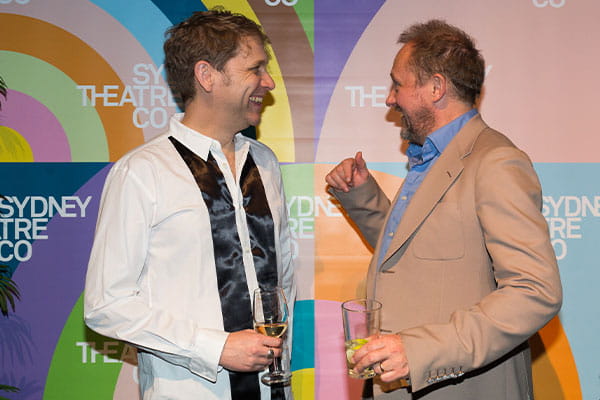
According to many of his colleagues, McIntyre has also imparted lessons in style and music taste to those he’s worked with.
“When I first met Patrick, I remember he would always wear the most amazing ties,” said Kip Williams.
“He has a very distinct and amazing fashion sense, which over the years has been a great point of bonding. We also speak a lot about art and music. One of my favourite things is sharing a new band with him or hearing about an album that he loves. Or that sometimes when I wander into his office he’ll have a great Spotify playlist going and I have to get out my Shazam app.”
Heather Mitchell said she would greatly miss “gravitating towards Patrick” in the foyer after the Opening Night of a show.
“I always love to know what he thinks of a show,” Mitchell said. “He's incredibly supportive, and he sees everything multiple times so he's able to always give a perspective of the growth of a show from the rehearsal to opening night and beyond. He's also very literary, with a great knowledge of where a piece of theatre sits in the world, so he can put things in a great perspective. I love that. He's not afraid to talk about how he feels about things, he's very open which I think is wonderful.”
STC Chair Ian Narev said Patrick had made a lasting contribution to STC.
“He is respected by all STC’s stakeholders for his rare combination of intellect, creativity, passion for the arts and caring for people,” Narev said. “For some time he has been open with the Board about his desire for a new challenge after more than a decade in this role. This exciting opportunity has come at a time when STC has strong audience and donor engagement, has opened a new world-class theatre, and has positioned itself to recover after the unprecedented challenges of 2020. So whilst we are very sad to lose him, he goes with our full support and deep gratitude. The National Film and Sound Archive is gaining a leader of the highest calibre.”
Final word from Kip Williams:
“It really has been a huge privilege and a masterclass to work with Patrick. I came into this job really green and I feel very, very lucky to have worked with somebody who has been so generous with me and has been so supportive. I've learned so much and built a great friendship - we’ve laughed and also shed many tears. I will really miss his guidance. I constantly ask myself, what would Patrick think? I’ll miss having him here because he always offers such extraordinary wisdom and advice as to how we should respond to a situation. It's really sad to be losing him, but we’re all really happy for him too.”
In February 2022, STC will welcome Anne Dunn as our new Executive Director. Anne arrives at STC with extensive experience in arts leadership, a passion for all things theatre, and is joining us from Sydney Dance Company where she has led as Executive Director for the last 12 years. Read more about Anne’s appointment here.